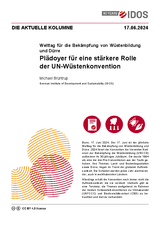The Current Column
World Day to Combat Desertification and Drought
Plea for a stronger role for the UN Convention to Combat Desertification
Brüntrup, MichaelThe Current Column (2024)
Bonn: German Institute of Development and Sustainability (IDOS), The Current Column of 17 June 2024
Bonn, 17 June 2024. 17 June is the annual World Day to Combat Desertification and Drought. 2024 also marks the 30th anniversary of the United Nations Convention to Combat Desertification (UNCCD). It was launched in 1994 as one of the three Rio Conventions. Its topics, land and soil degradation as well as drought, are receiving increasing global attention. The damage is becoming more alarming every year, even in wealthy countries.
However, the convention is still not receiving the attention it deserves. Instead, there is a tendency to consider the topics largely within the framework of the two sister conventions on climate change (UNFCCC) and biodiversity loss (CBD) and to negotiate them there.
On the one hand, this is to be welcomed, as these two conventions are driving forces in international environmental debates. However, it does not do justice to the UNCCD and can lead to these topics not being properly considered and therefore not being dealt with effectively. This is because the UNCCD has a particularly balanced view of the two poles in environmental debates: on the one hand, the protection of the environment and, on the other, the use of land as a natural resource. Striking the right balance is particularly important in this case, because the largest group of poor and vulnerable people live from land and soil: Approximately 500 million smallholder families with over 2 billion people in low- and middle-income countries.
The UNCCD was considered an African convention 30 years ago. At the time, desertification was considered the continent's most important environmental challenge. This alone explains why the aspect of sustainable use and restoration of soil as was particularly important. Small farmers generally had and still have no alternative to agriculture. Although most rich countries joined the convention in order to support the affected countries, they defined themselves as “not affected”.
Although the focus on Africa and on dry locations, which are considered particularly susceptible to devastation, had the advantage that the African countries identified strongly with “their” convention, the hope of special financial aid in the fight against devastation was not fulfilled. In the period 2014-2016, for example, only just under 6% of official development assistance (ODA) for the implementation of the Rio Conventions was earmarked on desertification, with the rest going to climate change and biodiversity. These often see the protection of resources as a priority rather than their use, which at best is considered a “co-benefit”.
The UNCCD's special perspective on the protection and simultaneous use of resources is well illustrated by the concept of Land Degradation Neutrality (LDN). This recognises that land use is necessary and can lead to degradation, but demands compensation by improving soil quality to the same extent and on comparable sites. Experience with the LDN concept also shows that it makes sense for the UNCCD and its particular target group to move away from a narrow geographical focus towards a global approach. This is because it has now been endorsed by over 140 countries, including many rich countries that had defined themselves as “not affected” under the desertification target. Soil conservation is now recognised as a global challenge, it is anchored in Sustainable Development Goal 15 (Life on Land), and the UNCCD has become the “custodian agency” of the corresponding indicator. As a result, the Convention has global significance for the first time, which has given it an enormous boost in importance and attention and significantly increased the financing of the issue through international funds such as the Global Environment Facility.
What does all this mean for the future of the UNCCD and what role can Germany play? The convention should be strengthened for the core issues of land/soil and drought resilience in order to specifically promote the compatibility of protection and use. Germany has already done a lot to achieve this, but could do even more. For example, it could broaden the basis of the convention by defining Germany and Europe as “affected” and not just “supporting” members. It could promote the globalisation of the UNCCD by including it in other global forums such as global environmental or development finance programmes. It could pledge increased core funding to the UNCCD. It could increasingly integrate its own bilateral programs into formal cooperation with UNCCDs, as in the “Great Green Wall Initiative”.


